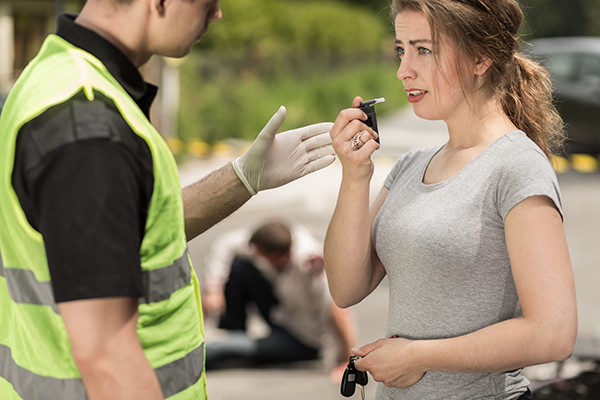A Breathalyzer is a device that is meant to estimate someone’s blood alcohol concentration, also called his or her BAC, simply by using a sample of the person’s breath. The first test of this kind was made for police use back in the 1940s, but the modern device we use now was created in 1954. 
How Does A Breathalyzer Work?
When you consume alcohol, it is circulated throughout your blood until it reaches the lungs, kind of like how carbon dioxide is diffused out of your blood. So when you breathe you are exhaling the alcohol in your lungs. A Breathalyzer does its job by measuring how much alcohol is present in your breath and is mean to provide an estimate of your blood alcohol concentration. The breathalyzer works on a breath-to-blood-alcohol ratio. It reads that there are 2,100 milliliters of alcohol in your blood for every 1-milliliter of alcohol present in your breath. Having a blood alcohol concentration of .08 or higher in the United States while driving is illegal. At this point, it is considered a DUI.
The Margin of Error on BAC Testing
There is indeed a margin of error when it comes to Breathalyzers. This margin of error can be up to 15%. Around 20% of people charged with a DUI can end up being victims and an inaccurate Breathalyzer test. The best and most accurate way to accurately test a person’s BAC is by doing a blood test.
Can Anything Affect the Accuracy?
Since a Breathalyzer test does not physically test your blood alcohol concentration but just gives an estimate, several things can lower the accuracy of results. One factor that is out of your control is having a high body temperature. This can make the results of this test higher due to volatility. Lower readings can also happen when a test is administered before the alcohol has fully absorbed into your blood. It can take around 1 to 2 hours after drinking to see the most accurate results. Differences in your blood composition can also cause a higher breathalyzer reading as well.
Difference Between Alcohol And Other Chemicals
Sometimes, the Breathalyzer is simply unable to tell the difference between alcohol and other certain chemical compounds that can be lingering on your breath or near the test. Compounds containing Methyl, vinegar for example, and even the breath of someone who suffers from diabetes can cause inaccurate tests. Some other things that may cause a higher reading might be blood, vomit, having acid reflux, or recently using mouthwash. Correct calibration and software in the Breathalyzer itself are also important. An alcohol breathalyzer must be calibrated every so often and batteries replaced to maintain accuracy. They also run on software, just like computers on operating systems. SO sometimes they have glitches or bugs.
Multiple Types of BAC Technology
There are also different kinds of BAC technologies that can vary inaccuracy. The first is known as Semiconductor Sensor Technology. This kind is often subject to showing false positives but isn’t generally used by law enforcement. This is a less expensive, personal option that uses a Tin-oxide material. The other kind is known as Fuel Cell Technology. This test is more sensitive and uses a platinum material inside. This test is used by law enforcement. While more accurate, there still is a margin of error While breathalyzer tests are mostly accurate, they do still have errors. If you think you have fallen victim to a false positive or an inaccurate BAC test, you should ask for a blood test for the most accurate results. If you or a loved one suffer from alcoholism, it is time you get the help you need before it is too late. There is hope that Evoke Wellness at Miramar can help you get on the path to sobriety and stay on it.


